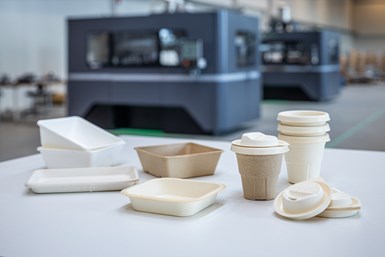Industrial-Grade 3D-Printed Tooling Portfolio Targets Fast, Affordable and Local Tooling Solutions
ExOne launches its X1 Tooling portfolio offering new solutions for plastic injection molding or forming, laying up composites, casting metals and more.

Photo Credit: ExOne
ExOne Co., a global provider of industrial sand and metal 3D printers using binder jetting technology, launches X1 Tooling, a broad portfolio of industrial-grade 3D printed tooling that includes new solutions for plastic injection molding or forming, laying up composites, casting metals and more.
The X1 Tooling line is designed to offer tooling options that speed up delivery times and bring tooling closer to the point of final production. Users that 3D print their tooling can help eliminate supply chain issues and make themselves more sustainable, with less shipping and other forms of waste. This fast, flexible tooling portfolio includes six new, affordable tooling applications, the company says.
For plastic production, X1 offers two options: X1 MetalTool is a new 3D-printed metal tooling option which has passed preliminary tests to replace standard steel or aluminum tooling for plastic injection molding, blow molding and other plastic forming applications. It is available in 420i (said to be a highly durable and affordable steel-bronze matrix), as well as 316L stainless steel, M2 tool steel and more. This tooling can be finish machined, acid etched and polished to a diamond finish, and is well suited for complex inserts. The second option is X1 ThermoForm which involves a 3D-printed sand form infiltrated with a durable resin and coated to create small- to large-format molds for a variety of thermoforming applications, such as vacuum forming, compression molds, foam molding and more.
For composite production, X1 offers X1 Layup and X1 Washout. X1 Layup involves a 3D-printed sand form infiltrated with a durable resin and coated for high-precision, high-temperature composite layup applications. It offers dimensional tolerances of ±0.025" and the tooling can be precision machined, if needed. X1 Washout is a 3D-printed sacrificial tooling that washes out with tap water after traditional layup and autoclaving of composite materials, including carbon fiber. It is a sand form 3D printed with a water-soluble binder and surface coated. It is well suited for ducting, mandrels and other designs with trapped geometries.
For metal production, X1 offers three options: X1 SandCast delivers sand tooling in a variety of sand types and binders, including sustainable inorganic formulas for high-quality aluminum castings. X1 MetalTool, a tool for plastic forming applications, can also be used to directly 3D print end-of-arm tooling, and rugged, perishable or consumable tools in a variety of metals, including tool steels. While still in development, X1 DieMold is used in rugged die molds 3D printed in H13 tool steel and is currently being fast-tracked with several global manufacturers after passing proof-of-concept tests.
All sand- and sand-infiltrated tools are produced using ExOne S-Max series printers with build volume measuring 1,800 × 1,000 × 700 mm (70.9" × 39.4" × 9.84"). X1 MetalTool and X1 DieMold tools are 3D printed in an X1 25Pro with build volume of 400 × 250 × 250 mm (15.75" × 9.84" × 9.84"); development is underway for printing in the larger X1 160Pro.
Related Content
-
How to Supply Cooling to Additive Tooling
Additive tooling provides limitless options for cooling a mold’s difficult-to-cool areas.
-
In "Hybrid" FIM Process, 3D Printing Complements Injection Molding
Alpine Advanced Materials used a desktop 3D printer and the freeform injection molding process to reduce prototype tooling production time and cost for its customers.
-
3D Printing Enables Better Coolant Delivery in Milling Operations
Just like 3D printing enabled conformal cooling channels in molds, additive manufacturing is now being used to optimize coolant delivery in cutting tools.















